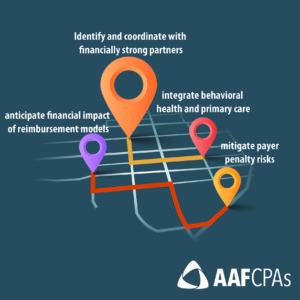Identifying strategic partnership options for provider organizations navigating reimbursement complexities
Behavioral health is one of many healthcare sectors caught in the midst of uncertainty, as healthcare reform again stands on the cusp of massive changes. With the reimbursement model shifting from fee-for-service to fee-for-value, provider organizations are tasked with understanding those changes, while determining what an episode of care entails.
Behavioral health is one of the areas that remains ambiguous. Pricing for behavioral healthcare continually stumps payers, as ongoing care is typically needed. Medicaid has traditionally helped patients with behavioral health issues seek the treatment they need, but with the cuts the government is currently suggesting, behavioral health could be fundamentally affected.
As such, payers must evaluate how they will structure their value-based reimbursements in this area. One solution relies on the emerging model of population health — health outcomes that apply to a large patient population. Population health has been a hot topic in the healthcare industry and is considered a key component in ensuring that higher quality care at lower costs can be delivered to population groups. Using this as part of the solution, however, is largely dependent on provider organizations’ ability to effectively extract proper data and analytics.

Behavioral health must be integrated into a population’s health profile to ensure patients receive a holistic and coordinated plan for care delivery. Financially, health management is complex because first-and-foremost there are limited funds, and payers are figuring out how to approach these health issues that don’t have an easily defined episode of care. Healthcare organizations are evaluating the most efficient and effective way to allocate the money they do receive, and preparing for risks that appear when the patient cannot “get better” and a penalty is inevitable.
In Massachusetts, we are seeing community health centers and behavioral health agencies experience common patient overlaps, which is causing a natural integration between the two organizations. At first, these providers assumed the government would view the integration as positive, resulting in higher billings. Unfortunately, it has been difficult to take a holistic view of how behavioral health affects the entirety of the patient’s journey. As ACO (accountable care organization) models gain popularity, billing and risks need to be accounted for.
Our clients are currently seeking our guidance and expertise on the following questions:
- How do provider organizations best identify and coordinate with financially strong partners that provide high quality care?
- How do providers anticipate the financial impact that is going to accompany confusing reimbursement models?
- How can they best navigate the integration between behavioral health agencies and PCPs?
- How can they mitigate payer penalty risks, and support a potential loss incurred?
At AAFCPAs, we work with provider organizations’ CFOs and executive management to support readiness for value-based reimbursement models, including: establishing the financial flows and solutions for long-term services that serve the patient base. As provider organizations focus on behavioral health and the perspective payment systems, it will be critical that care is coordinated and that all ongoing medical issues are anticipated. We advise our clients to evaluate the complete care coordination process as it applies to the entire continuum of care.
A major concern we hear is around the Centers for Medicare and Medicaid Services (CMS) approval of the 1115 waiver ( the waiver supports the restructuring of the MassHealth program to provide integrated, outcomes-based care to 1.9 million Massachusetts residents), and if that pool of money is going to help provider organizations get their program off the ground. As this waiver could potentially be repealed, we advise organizations to:
- Understand the implications of MassHealth Reform
- Develop innovative care delivery solutions that are less costly and more efficient
- Evaluate their financial structure and identify organizations with which they can partner
- Establish a cash reserve to account for reimbursements they may not receive under the fee-for-value model or to cover unforeseen penalties
- Develop a proposition plan to present to ACOs based on realistic data, and prepare to answer questions received based on analysis & facts
As the financial performance of provider organizations continues to be directly correlated to the quality of care, it is important to maintain the proper partnerships and solid infrastructures needed, especially when care for behavioral health requires provider, payer and patient to work together to achieve optimum outcomes.
For advice, specific to your organization, or to learn more about how AAFCPAs’ healthcare expertise may help you overcome these hurdles, please contact Matt Hutt, partner, at 774.512.4043 or mhutt@nullaafcpa.com or your AAFCPAs partner

